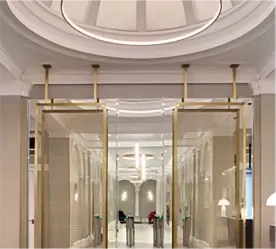Understanding the Importance of Expanded Metal Mesh Thickness
Expanded metal mesh is a versatile material that has found applications across various industries, including construction, architecture, and manufacturing. Known for its unique properties, expanded metal mesh is created by slitting and stretching metal sheets into a mesh-like pattern, resulting in a lightweight yet durable structure. One of the critical factors that affect the performance and suitability of expanded metal mesh for specific applications is its thickness.
What is Expanded Metal Mesh Thickness?
Expanded metal mesh thickness refers to the gauge or measurement of the metal used in its production. This thickness can vary significantly depending on the type of metal, the intended application, and the specific requirements of the project. Common materials used for expanded metal mesh include aluminum, steel, and copper, each offering different characteristics, such as strength, corrosion resistance, and weight.
Why Thickness Matters
The thickness of expanded metal mesh plays a vital role in determining several performance factors
1. Load-Bearing Capacity Thicker metal expands the load-bearing capacity of the mesh. In applications like walkways, grating, or platform panels, a thicker gauge is essential to support heavier loads without deformation or failure. For instance, heavy industrial applications often require thicker expanded metal sheets to withstand the rigorous demands of heavy machinery and equipment.
expanded metal mesh thickness

2. Durability and Longevity A thicker expanded metal mesh generally offers greater durability and resistance to wear and tear. This characteristic is crucial in outdoor applications where the mesh may be subjected to harsh environmental conditions. Thicker mesh is less likely to bend or break, ensuring a longer lifespan and reduced maintenance costs.
3. Safety In settings like stair treads or flooring, the thickness of expanded metal mesh can significantly impact safety. A thicker mesh can provide better traction and support, reducing the risk of slips and falls. This is particularly important in industrial environments where safety is paramount.
4. Aesthetics The thickness of the mesh also affects its visual appeal. Thicker expanded metal can impart a more substantial and robust look to architectural designs, making it suitable for modern and bold constructions. Conversely, thinner mesh may be chosen for applications where transparency and a lighter aesthetic are desired.
5. Cost Considerations The thickness of expanded metal mesh will also influence its cost. Thicker materials typically cost more, which can impact budget considerations. It is essential for designers and project managers to weigh the benefits of using thicker material against their project budget and specific requirements.
Choosing the Right Thickness
When selecting expanded metal mesh, it is crucial to consider the specific application and performance requirements. Factors such as load capacity, environmental conditions, aesthetic preferences, and budget constraints should all be evaluated. Consulting with suppliers or engineers can help determine the optimal thickness for a given project.
In conclusion, the thickness of expanded metal mesh is a critical factor that affects its performance, durability, safety, and aesthetics. Whether used in industrial settings, architectural designs, or safety applications, understanding how each aspect of thickness influences the mesh’s functionality will allow for informed decisions that lead to successful project outcomes. With the right choice of thickness, expanded metal mesh can provide reliable, long-lasting solutions tailored to meet diverse needs across different industries.
-
Turn Down the Noise: The Future of Highway Sound Barriers
NewsApr.09,2025
-
Silence the Sound: The Power of Highway Noise Barriers
NewsApr.09,2025
-
Reduce Road Noise Effectively with Highway Noise Barriers
NewsApr.09,2025
-
Noise-Free Living: How Highway Barriers Make a Difference
NewsApr.09,2025
-
Engineered for Silence: Highway Noise Barriers for Every Road
NewsApr.09,2025
-
Effective Noise Control: Highway Barriers for a Quieter Tomorrow
NewsApr.09,2025
Subscribe now!
Stay up to date with the latest on Fry Steeland industry news.

